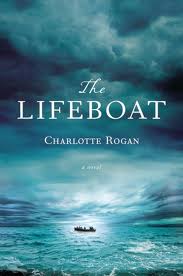This book is being published in England by my idols Virago Press, and should be on UK shelves by end of March. The Hebrew edition will be published by ours truly, but I don’t yet have a tentative date. Will post when I do…
Grace Winter, newly married to the rich and handsome Henry, is one of 39 survivors on a lifeboat after the wreck of the Empress Alexandra. The book opens with her standing trial for murder along with two of the other female survivors, though we don’t know of whom or any of the other circumstances, and the book returns immediately to the moments following the shipwreck. Luckily, one of the 39 on the lifeboat was Mr. Hardie, a sailor from the ship who takes immediate control of the boat and its passengers given his knowledge of the sea and clear thinking in a crisis. At first he insists on their remaining near the wreckage to ensure that they will be picked up by the inevitable rescuers, but as more days pass and there is no apparent rescue attempt, he allows that they may as well try and sail for land. As the days pass Hardie warns his charges that they are at over-capacity, and that in the event of bad weather the boat will capsize. He suggests volunteers to throw themselves overboard for the good of those left in the boat, and thus begins the main moral dilemma of the book. The narrative continues to switch between Grace standing trial and the torturous, sometimes hallucinatory days in the lifeboat, where the passengers by turns console and connive against one another. Won’t give much more away, but suffice it to say Rogan keeps the reader engaged in the plot despite the limitations of her setting (which actually work for her, in my opinion) and the temptation to go overboard (‘scuse the pun) with being philosophical.
The Lifeboat is a tightly plotted novel that works both as a psychological thriller and as story addressing an impossible moral dilemma. The highly particular circumstances giving rise to this dilemma do nothing to reduce its relevance or immediacy to a reader, and the ‘closed-room’ setting of a lifeboat allows Rogan to explore the dynamics of human relationships at their most real and raw. This she does skillfully, mediating everything through Grace’s strange passivity so that it feels both removed and hyperreal.
It’s also a book about unreliable narrators and unstable, variable versions of the same events. Though Grace is a likeable narrator, she doesn’t come across as reliable – even by her own estimation. She frequently asserts her own uncertainty regarding her memories of the events in the lifeboat, but the reader (and those around her) are never quite sure when she is posturing and when she is truly in the dark about her own motivations or actions.
What Rogan does particularly well is show how Grace’s ‘God helps those who help themselves’ philosophy applies both to her situation pre and post shipwreck. This in turn makes Grace (with all her unreliability) very credible and convincing, and the fine balance Rogan strikes between depicting her admirable tenacity in insisting on taking control of her life and her acceptance of her own vulnerability is pitched perfectly (again, no pun intended…they’re all just bobbing up unintentionally).
The other characters are also well drawn, but Rogan’s real success lies in how she portrays the relationships and interactions between the different personalities on the boat. These are consistently complex, convincing and engaging, and Rogan manages to make them both inevitable in the context of the psyches she has assembled, and also strangely supernatural – as with Mrs. Grant’s curious hold on the passengers of the boat, by turns appearing almost mystical and at others merely the absolute power a parent holds over their dependents.
Above all, instead of using the characters as mouthpieces for philosophical discussions of the moral dilemmas produced by this life or death situation, Rogan turns them into desperate children who decide based less on careful consideration and dry discussion than impetuosity, fear, caprice or the desire for approval.
The structure of the book also functions perfectly to highlight the slow passing of the days and the nights in the lifeboat, and the juxtaposition between the moral question playing out in the boat and then rehashed in the courtroom dramatizes precisely one of the central questions Rogan seems to be asking in the book – how do certain situations impact our ideas about what is acceptable and what is not.
The book is not without its entertaining moments, and Rogan’s writing is accomplished, the dialogue feeling authentically ‘of’ the historical period. There were a couple of moments where Grace seemed to be describing moments straight of Titanic, but the believability of Rogan’ setting didn’t suffer as a result. The Lifeboat was a quick, clever read and I would recommend keeping an ear to the ground for its publication.
For more info on the book or the author, click here.

